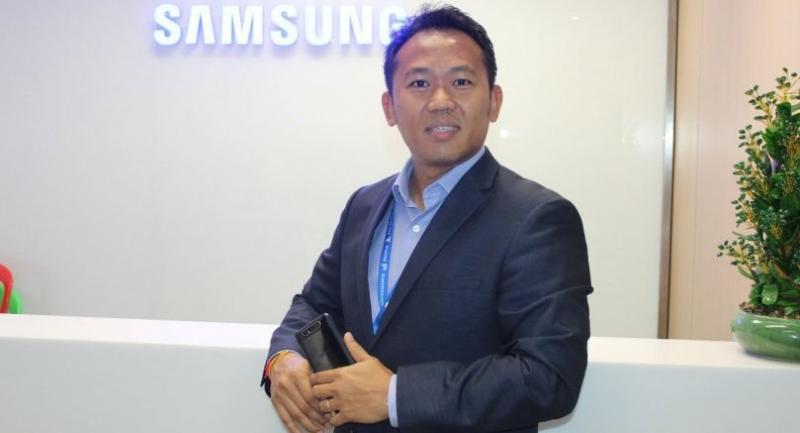Samsung Myanmar sure of staying top

Amid stiff competition in the market as major smartphone brands vie for market share in Myanmar, South Korean giant Samsung Electronics remains confident that it will manage to maintain its leadership position this year, according to Zarni Win Htet, the head of mobile group at Samsung Myanmar.
“We were not happy with the slow-down last year, but we are fully confident that we will enjoy the minimum 10 per cent growth in terms of the revenue this year,” he said in an exclusive interview with The Nation.
“We have witnessed some positive moves by the authorities to enforce taxation regulations in domestic sales of mobile devices since the past few months. And our mobile products come up with higher quality so we continue to receive positive feedback from our customers.”
With the firm’s projection that Myanmar’s smartphone sales would be around US$500 million (Bt16o billion) this year, the executive foresees an industry average of 8 per cent increase in sales of mobile devices as well as 10 per cent growth in sales of Samsung products in the market.
“The market response to our products is pretty good this year so we set a bit higher growth target than the industry average,” he said.
Zarni Win Htet takes pride in saying that Samsung usually accounts for more than 25 per cent of the total market shares by major smartphone brands in Myanmar on a yearly basis.
Despite potential controversy over the accuracy of market statistics due to the limited access to reliable information in Myanmar, Samsung considerably takes a larger market share than its major rivals – Huawei, Apple, Sony, Xiaomi, Oppo and Vivo to name a few.
“We are doubtlessly the market leader in the highend smartphone category (more than $600 in value), as our flagship series are the most popular in Myanmar,” he said.
“We are also No 1 in terms of the value of sales, though it is really hard to maintain our leadership position in terms of the number of mobile phones sold,” he added, referring to the firm’s lack of low cost phones valued under $100.
Among its flagship phones, the executive considers the Note series as the most popular in Myanmar, as they are considerably “most loved” by businesspeople. The S series phones are considerably the most popular among Myanmar youths, and the A series are also among the bestsellers thanks to their high quality at an affordable price.
“Obviously, flagship series are one of the key drivers of our growth in Myanmar. But on average, mid-range smartphones valued between $130 and $260 are truly the best sellers here,” he said.
According to the executive, competitiveness is still the main challenge for authorised dealers who must pay 12 per cent of the value of imported goods for sale, 5 per cent commercial tax, 5 per cent Customs duty and 2 per cent with-holding tax.
In a bid to take advantage of Myanmar’s exemption of custom duty on imported mobile phones manufactured in Asean countries, around 95 per cent of Samsung phones are imported from Vietnam while the remainder comes from China and other nations.
“Even though we mainly import from Vietnam to reduce transaction costs, it is still hard for us to be competitive in terms of pricing, compared to those who illegally import similar products through some border areas,” he said.
“They [illegal traders] can sell the same products at a much cheaper price because they did not pay any tax to the government. Honestly, we can’t compete with them, as we have to pay an additional 7 per cent value of imported goods at the minimum. This is something that authorities must urgently address.”
He warmly welcomed the government’s recent decision to generate more income from taxation on mobile phones sales.
“It is truly a step in the right direction. But, enforcement of the tax regulations is necessary. Here in Myanmar, newly-enacted laws and regulations are really good and on a par with international standards, but we are still weak in enforcing them,” he said.
The executive said Samsung Myanmar would keep on investing in customer care programmes from this year on. Currently, the firm facilitates business of more than 50 brand shops and a number of service centres across Myanmar.
“We do care about after sale services. Earlier this month, we launched our 24/7 call centre to improve our customer service and the user experience,” he said.
“We have covered our distribution and service network across the country, except two regions – Chin and Rakhine. One of our service centres in Yangon is the largest of its kind in Southeast Asia.”
The firm would further invest in its two core business areas – mobile and consumer electronics.
The former accounts for 80 per cent of Samsung Myanmar’s business operations while the latter takes the remaining 20 per cent only.





